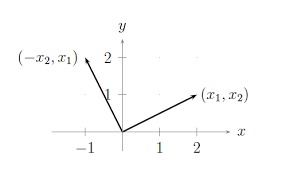What is Linear Algebra? Linear algebra serves as the foundation for many mathematical disciplines, including computer science, physics, engineering, economics, and statistics. Despite its abstract nature, it provides essential tools for solving real-world problems and understanding complex systems. In this blog post, we’ll delve into the basics of linear algebra, exploring its concepts, applications, and significance.
Learnerscamp comes to your aid when it comes to understanding what is Linear Algebra. With the help of study guides ,practical examples as well as their well structured questions, answers and explanations regarding Linear algebra, you should be in a better position to advance your linear algebra knowledge.
Learnerscamp is a learning platform for students wishing to know anything in math related topics. Moreover , students can even do tests and see their reports and measure their performances over time.
What is Linear Algebra

Linear algebra is a branch of mathematics that deals with vector spaces and linear mappings between these spaces.
It primarily focuses on the study of linear equations, matrices, determinants, vector spaces, and eigenvalues.
These fundamental concepts form the building blocks for solving systems of equations, analyzing transformations, and modeling real-world phenomena.
Key Concepts in Linear Algebra:
- Vectors and Vector Spaces: A vector is a quantity that has both magnitude and direction. In linear algebra, vectors are represented as arrays of numbers. A vector space is a set of vectors that is closed under addition and scalar multiplication.
- Matrices: Matrices are rectangular arrays of numbers arranged in rows and columns. They are used to represent linear transformations and systems of linear equations. Matrix operations include addition, scalar multiplication, matrix multiplication, and matrix inversion.
- Linear Transformations: A linear transformation is a function that maps vectors from one vector space to another while preserving the structure of the vector space. These transformations are represented by matrices and can include rotations, reflections, scaling, and shearing.
- Eigenvalues and Eigenvectors: Eigenvalues and eigenvectors are properties of square matrices that represent how a matrix stretches or compresses space along specific directions. They play a crucial role in understanding stability, dynamical systems, and optimization problems.
Applications of Linear Algebra:
- Computer Graphics and Image Processing: Linear algebra is used extensively in computer graphics for tasks such as rendering 3D images, transforming objects, and applying filters to images. Techniques like matrix transformations and homogeneous coordinates are essential for creating realistic visual effects.
- Machine Learning and Data Analysis: Linear algebra forms the backbone of many machine learning algorithms, including linear regression, principal component analysis (PCA), and support vector machines (SVM). Data scientists use matrices and vectors to represent datasets, perform dimensionality reduction, and train predictive models.
- Quantum Mechanics: In quantum mechanics, vectors and operators are used to represent the states and observables of quantum systems. Linear algebra provides a rigorous framework for describing the behavior of particles, calculating probabilities. It also provides a basis for understanding phenomena like entanglement and superposition.
- Robotics and Control Systems: Linear algebra is vital in robotics for tasks such as robot kinematics, trajectory planning, and sensor fusion. Control systems engineers use linear algebra to analyze the stability and performance of feedback systems and design controllers for autonomous vehicles and robotic arms.
Significance
Linear algebra serves as a universal language for expressing mathematical ideas and solving problems across diverse fields. Moreover ,its concepts provide powerful tools for modeling, analyzing, and interpreting complex systems. In the natural and social sciences, engineering, and technology. By understanding linear algebra, students and researchers gain insights into the underlying structures and patterns that govern the world around us.
Linear algebra also plays a fundamental role in modern mathematics and its applications. From computer graphics and machine learning to quantum mechanics and robotics. By mastering its concepts and techniques, individuals can not only unlock new insights but also develop innovative solutions, and contribute to advancements in science and technology. Whether you’re a student, a researcher, or a practitioner in a STEM field, proficiency in linear algebra is essential for navigating the complexities of the digital age.




